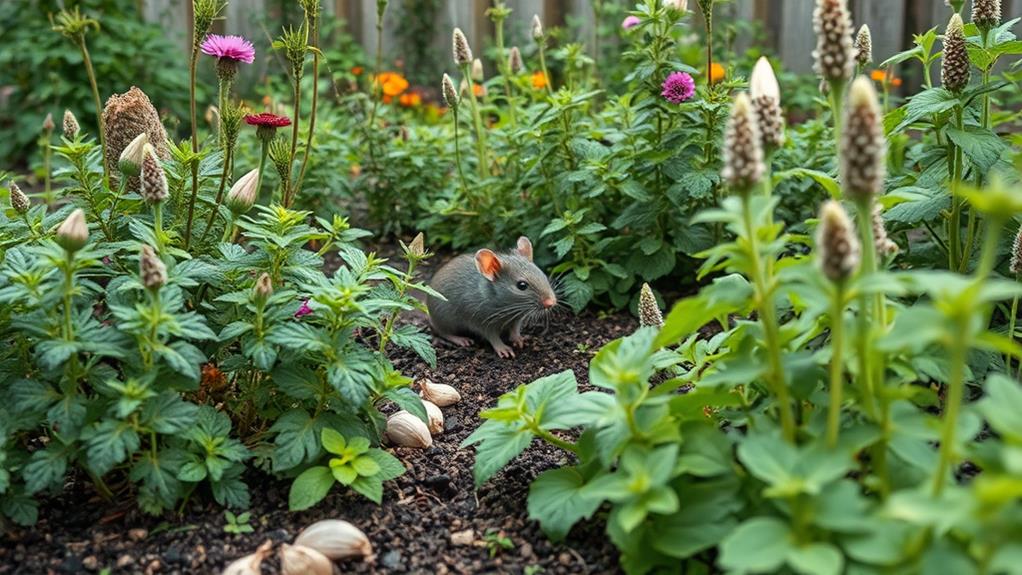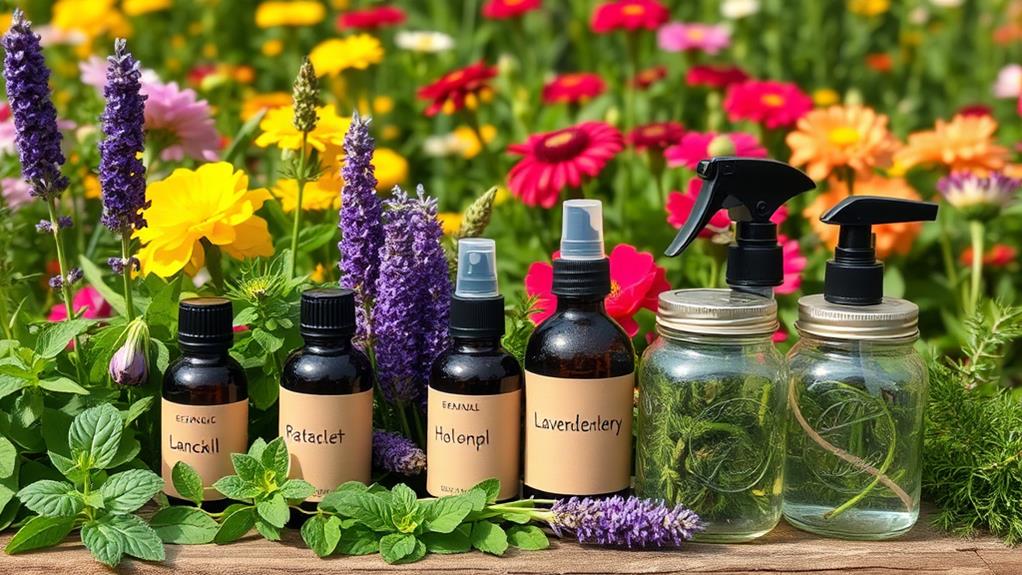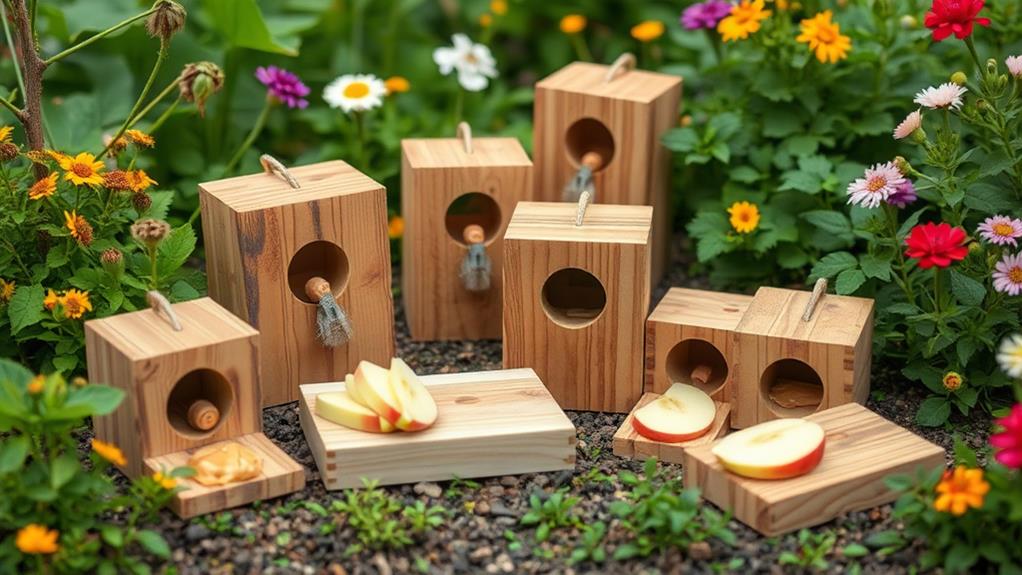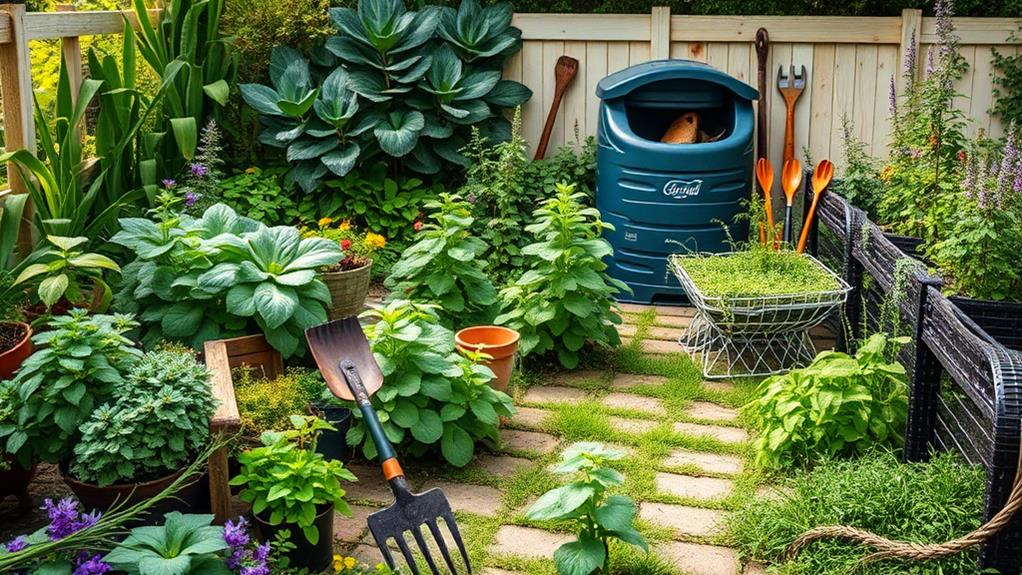If you've ever found evidence of rodents in your garden home, you know how unsettling it can be. Fortunately, you don't have to resort to harsh chemicals to keep them at bay. By using simple, natural ingredients like cayenne pepper and vital oils, you can create effective repellents that deter these pests without compromising your garden's integrity. But before you start mixing, it's crucial to understand rodent behavior and what truly drives them away. The key lies in a combination of strategies that might surprise you.
Understanding Rodent Behavior

When you understand rodent behavior, you can better tailor your approach to keeping them away. Rodents, like mice and rats, are clever little creatures. They love to explore their surroundings, searching for food and cozy places to nest. If you've ever spotted one darting across your kitchen floor, you know they're quick!
They're also great at squeezing into tiny spaces, so it's important to seal up any gaps in your home.
Rodents are mainly nocturnal, meaning they're most active at night. If you hear noises while you're trying to sleep, it might be them throwing a late-night party! They're social animals, often living in groups, which makes them even more determined to find food.
If they smell something tasty, they won't hesitate to investigate, so keeping your food stored properly is key.
Additionally, rodents are excellent climbers and swimmers, so don't underestimate their skills. Understanding these behaviors helps you identify what attracts them and how to prevent their invasion.
Natural Ingredients for Repellents
To keep rodents at bay, incorporating natural ingredients into your repellent strategies can be highly effective. You might be surprised by how many common items can help protect your garden and home.
For starters, think about using cayenne pepper. Sprinkling this spicy powder around your plants can send rodents scurrying away. They really don't like the heat!
Another great option is garlic. Rodents can't stand the strong smell, so mixing garlic powder with water and spraying it around can create a pungent barrier.
You could even try using vinegar. Its strong scent works wonders in deterring those pesky critters. Just mix equal parts water and vinegar in a spray bottle and apply it where you see rodent activity.
Additionally, consider using the peels of citrus fruits like oranges and lemons. Just scatter them around your garden; the smell will keep rodents at a distance.
Finally, planting certain herbs, like mint, can also help. Rodents dislike the scent, and you'll get a tasty treat for yourself, too!
With these natural ingredients, you can create a fortress against those unwanted guests. Happy gardening!
Essential Oils That Deter Rats

Using essential oils can be a powerful way to deter rats from invading your space. These natural scents can send those little critters packing! Some of the best oils to use include peppermint, eucalyptus, and citronella. Rats dislike strong smells, and these oils pack a punch.
Peppermint oil is a favorite for many gardeners. Just a few drops around your home can create a minty barrier that rats won't want to cross.
Eucalyptus oil is another strong contender, known for its invigorating scent. It's like a spa day for you, but a nightmare for rats!
Citronella, famous for keeping mosquitoes away, also works wonders for repelling rodents.
To make the most of these essential oils, consider soaking cotton balls in your chosen oil and placing them around entry points, like doors or windows.
Just remember to renew them every week or so, as the scent fades over time. It's like giving your home a little aromatherapy!
Creating Homemade Repellent Sprays
Creating homemade repellent sprays can be an effective way to keep rats at bay while utilizing natural ingredients.
First, gather your supplies: a spray bottle, water, and some essential oils. You can use oils like peppermint, eucalyptus, or citronella, which rats find super unpleasant.
To make your spray, fill the bottle with about 2 cups of water and add 15-20 drops of your chosen essential oil. Shake it up well, and voilà! You've got a powerful repellent.
Now, find the spots where you've noticed rat activity. Give those areas a good spritz! Make certain to reapply every few days or after it rains, since the scent can fade.
Don't forget to test your spray in a small area first to verify it doesn't damage any surfaces.
And remember, while it smells fresh to you, it's a big "no thanks" for the rats!
Plus, you'll feel good knowing you're using natural ingredients instead of harsh chemicals.
Effective Traps Using Natural Baits

Crafting effective traps with natural baits can dramatically increase your chances of successfully capturing unwanted rodents. Instead of using harsh chemicals, you can rely on simple, natural ingredients that attract those pesky critters. One popular bait is peanut butter. Just a small dollop on a trap works wonders! Rodents can't resist its nutty aroma.
Another great option is dried fruit. Think raisins or apricots; they're sweet and irresistible. You can even mix some seeds with a touch of honey for a sticky treat that'll lure them in.
Remember, the key is to place your traps in areas where you've spotted rodent activity, like near droppings or gnawed items.
When setting the traps, be sure to keep them away from pets and kids. You don't want any surprises! Check the traps regularly, so you can remove any captured rodents promptly. It's not just about catching them; it's also about keeping your space clean and safe.
Using these natural baits not only helps you deal with rodent problems, but it also makes you feel good about using eco-friendly methods. Happy trapping!
Planting Rat-Repellent Herbs
Planting rat-repellent herbs can be a smart and natural way to deter rodents from your home and garden. Certain herbs not only add flavor to your meals but also keep pesky rats at bay. You might want to take into account planting mint, lavender, or rosemary. Rats dislike the strong scents of these herbs, making your garden a less inviting place for them.
To get started, choose a sunny spot in your garden or use pots if you have limited space. Mint grows quickly, so be careful—it can take over! Lavender and rosemary, on the other hand, love dry soil and need less water.
Once you've got your herbs planted, watch how they thrive while repelling those unwanted furry guests.
Don't forget to snip some herbs for your cooking! Fresh mint in your tea or rosemary on your roasted veggies adds a delightful touch.
Maintaining a Clean Garden

A clean garden plays an essential role in keeping rodents at bay, complementing your efforts in planting rat-repellent herbs. If you want to create a rat-free zone, start by tackling any clutter.
Rodents love hiding in piles of leaves, old pots, or garden tools left lying around. So, put on your gardening gloves and tidy things up!
Next, keep your garden free of fallen fruits and veggies. They might be tasty snacks for you, but for rodents, they're a buffet!
Regularly check for any overripe produce or plant debris, and toss them in the compost bin. Speaking of compost, guarantee it's covered and stored properly. An open compost pile can be a rodent paradise.
Don't forget about your trash! Make certain any bins are sealed tight and emptied regularly.
Rodents aren't picky eaters, and they'll take any chance to munch on your leftovers.
Additional Prevention Tips
Take proactive steps to deter rodents by sealing entry points around your home. Check for gaps or holes in walls, windows, and doors. If you can fit a pencil through it, a mouse can sneak in! Use caulk or steel wool to fill these spaces.
Next, keep your outdoor area tidy. Store firewood and garden supplies off the ground, and don't leave pet food outside. Rodents love a free meal, so make sure you're not offering one!
Consider planting strong-smelling herbs like mint or rosemary around your garden. These scents can help keep those pesky critters at bay. You might even enjoy the aroma while you're out there tending to your plants!
Also, set up traps in areas where you've spotted signs of rodents. It's an effective way to catch them before they become a bigger problem. Just remember to check them regularly!
Lastly, if you notice any rodent activity, don't ignore it. Take action quickly; the sooner you respond, the better chance you have of keeping your home rodent-free.
With these tips, you'll be well on your way to a happier, healthier garden home!
